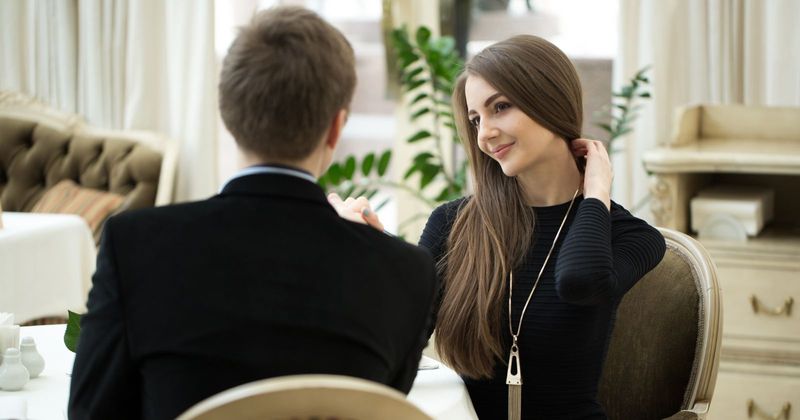16 Signs Your Husband Might Be Falling For His Secret Crush
Relationships often face challenges, but when subtle shifts in behavior become patterns, it might hint at something deeper.
While it’s crucial to approach the topic with sensitivity, recognizing these signs can help in understanding what’s happening beneath the surface.
This post aims to shed light on those small, yet telling signals that might suggest your husband is developing feelings for someone else. Here are 16 signs that could indicate he’s falling for his secret crush.
1. He suddenly cares way too much about how he looks

It starts with a new cologne—something bold and different from his usual scent. He spends extra time in front of the mirror, perfecting his appearance before heading out. A new haircut, meticulously styled, catches your eye. His clothes, now wrinkle-free and carefully chosen, suggest an interest in impressing someone.
Consider how he used to dress for work or casual outings; if there’s a noticeable change, it could mean he’s trying to catch someone’s attention. This renewed focus on appearance might be harmless, but combined with other behaviors, it might raise eyebrows.
When he suddenly becomes fashion-forward or overly concerned with his grooming habits, it’s worth noting. Keep an eye on these changes, especially if they’re accompanied by other unusual behaviors. A newfound interest in looking good isn’t inherently bad, but it might hint at someone else’s influence.
2. He guards his phone like it’s top-secret

His phone, once carelessly left on the table, now follows him like a shadow. Passwords are changed with alarming frequency, and notifications are silenced. He holds his phone close, reacting defensively if you even glance its way.
This secrecy is a stark contrast to the openness you once shared. It might be a new hobby or project he’s working on, but the sudden shift is hard to ignore. The device that used to sit charging across the room is now glued to his side, even during dinner.
You might catch him muttering or smiling at the screen, suggesting there’s more going on than meets the eye. If his phone habits change overnight, take note. While privacy is important, excessive guarding could signal he’s hiding more than just a surprise birthday plan.
3. He drops her name into conversations too casually

Casual mentions of ‘her’ start to pepper your conversations. “Oh, Emily said something similar,” he casually throws in, as if she’s a regular part of your lives. Even if you haven’t met this Emily, her name pops up in stories, jokes, and anecdotes.
At first, it might seem harmless—friends and coworkers often come up in conversation. But when her name becomes a fixture, it’s worth paying attention to. Does he light up ever so slightly when he talks about her? Observe his tone and enthusiasm, noting if he lingers on details.
This casualness can be a sign that she occupies a more significant place in his thoughts than a mere acquaintance typically would. While it’s natural to have friends, someone who enters conversations unprompted could indicate a deeper connection.
4. He acts weirdly defensive when you bring her up

Mention her name, and he stiffens. His eyes flick away, and his voice adopts a defensive tone, as if you’re accusing him of something. “Why do you always bring her up?” he might retort, even if it’s the first time.
This defensiveness is a red flag, especially if he usually shrugs off questions about friends or colleagues. His reaction might seem disproportionate, indicating he’s hiding something or feeling guilty. It’s the kind of behavior that suggests there’s more to the story.
Observe how he reacts to questions about other friends compared to her. If his demeanor changes only when she’s mentioned, it could suggest he’s harboring feelings he hasn’t acknowledged yet.
5. He starts picking fights for no reason

Tensions rise over the most trivial things—a misplaced remote, an unwashed dish. Where once there was humor and understanding, now there’s irritation and frustration. He seems to be looking for reasons to argue, creating distance where there was once closeness.
This pattern might be his way of coping with emotions he can’t quite understand. Rather than facing them, he redirects them into conflict, hoping the noise will drown out what’s happening inside. Picking fights can also be a distraction, a way to avoid deeper conversations.
Keep track of these arguments and try to discuss any underlying issues when things are calm. Often, there’s more to these disagreements than meets the eye, hinting at struggles he might not even realize he’s facing.
6. He’s emotionally checked out, even when you’re right next to him

Physically present, but emotionally distant—this is how it feels when he sits next to you, his mind a million miles away. Conversations feel one-sided, like pulling teeth to get a response. His usual warmth and attentiveness are replaced by a cold, distracted demeanor.
This emotional absence might not be deliberate, but it’s impactful. It signals a preoccupation with something else, or someone else, taking up space in his heart and mind. The connection you once shared feels frayed, leaving you questioning where you stand.
Open communication can help bridge this gap. Gently inquire about his thoughts and feelings, offering a safe space for him to open up. While it’s important to respect his need for space, understanding the root of his distraction is crucial for resolving the issue.
7. He compares you to her—subtly but enough

Comments like “Emily would have loved this,” slip into your daily interactions. On the surface, these comparisons might seem harmless, but they can sting. When he juxtaposes your actions, tastes, or opinions with hers, it creates a silent competition.
This behavior might not be intentional, but it reveals a lot about his mental landscape. By comparing, he inadvertently measures you against this other person, hinting at the admiration he might feel for her. It’s a tricky situation, leading to feelings of inadequacy or resentment.
Address these comments calmly, expressing how they make you feel. Encouraging open conversations about boundaries and how comparisons can affect your relationship is essential. It’s not about eliminating friendships but understanding their impact on your partnership.
8. His compliments feel forced or robotic

Gone are the days when his compliments felt genuine and heartfelt. Now, they sound rehearsed, delivered with the enthusiasm of a robot. “You look nice,” he states, his eyes elsewhere, as if checking off a list.
These mechanical compliments can indicate a lack of emotional engagement. He’s going through the motions without truly connecting with the sentiment. It might be a sign that his emotional energy is invested elsewhere, leaving little for your relationship.
While everyone has off days, a pattern of insincere compliments is worth discussing. Encourage honesty and openness, creating space for genuine expressions rather than obligatory pleasantries. This shift can help realign your connection and bring authenticity back into your interactions.
9. He zones out when you talk, like his mind’s elsewhere

You’re in the middle of a story, but his eyes glaze over, his attention slipping away. He nods absentmindedly, missing key details, and you wonder if he’s even listening. It feels like talking to a wall, the connection between you stretched thin.
His mind, preoccupied with thoughts or feelings he hasn’t shared, leaves little room for your voice. This zoning out could be a sign that his emotional bandwidth is occupied, possibly by someone else. It’s a subtle shift that speaks volumes.
Addressing this might help rekindle the engagement in your conversations. Encouraging active listening and sharing might bring his focus back to the present moment, strengthening your bond and understanding.
10. He spends more time “at work” than ever before

Work has suddenly become his sanctuary, a place where he claims to be needed more than ever. Late nights and unexplained overtime become the norm, leaving you wondering what’s changed. While career demands can fluctuate, the timing seems oddly convenient.
This escape might be more about avoiding home than actual work. The extra hours might serve as a cover for spending time elsewhere, or it could be a way to bury emotions he can’t face. Either way, it’s a pattern that deserves attention.
Discuss his workload and share your concerns diplomatically. Understanding what’s truly behind these late nights can help address any underlying issues affecting his commitment to your relationship.
11. His mood shifts when her name comes up

Her name is mentioned, and his demeanor changes—subtle, yet noticeable. A flicker of annoyance or excitement, an unguarded smile or frown. It’s as if the mere mention of her stirs something within him.
These mood shifts are telling, revealing unspoken emotions or connections. Whether it’s happiness, nostalgia, or irritation, his reaction is a window into his heart. It might seem minor, but over time, these responses paint a deeper picture.
Observe how often her name incites a reaction. These clues can guide your understanding of his feelings and how they might be affecting your relationship. Open dialogue about these shifts can help navigate the complexities they represent.
12. He starts treating your relationship like a chore

Romantic gestures become mechanical, devoid of passion. Date nights feel obligatory, as if following a script rather than enjoying each other’s company. Your relationship, once vibrant, now feels like a series of tasks to tick off.
This shift might indicate he’s emotionally drained or distracted, treating your connection as a responsibility rather than a joy. It’s not just about the chores—it’s about the underlying sentiment that your partnership has become secondary.
Address these changes by exploring what might be causing this emotional fatigue. Encouraging open discussions about priorities and feelings can help rejuvenate your bond, turning chores back into shared experiences rather than duties.
13. He gets annoyed when you show affection

Your touch, once welcomed, now elicits a sigh or a shift away. Hugs are met with stiff arms, and kisses with a turned cheek. This irritation at affection is more than just a bad day—it’s a pattern.
Such reactions can signal emotional withdrawal or discomfort, suggesting he’s grappling with conflicting emotions. These signs might not mean he doesn’t care, but rather, he’s battling inner feelings he hasn’t expressed.
Approach the subject with sensitivity, aiming to understand rather than accuse. Encouraging honest conversations about emotional needs and boundaries can help clarify and address the tension in your relationship.
14. His phone is suddenly on silent—always

Once, the ping of his phone was a background rhythm in your home. Now, it’s eerily silent, notifications turned off, and vibrations muted. While he claims it’s for focus or peace, the timing feels suspect.
This change can be a sign of something he doesn’t want you to hear or see. The quiet phone, a stark contrast to its previous presence, suggests messages or calls he’d rather keep private. It’s a subtle shift, easy to miss, yet telling.
Discussing phone habits openly can shed light on this sudden silence. Conversations about digital boundaries might help ease suspicions and restore trust, addressing any underlying issues.
15. He avoids eye contact more than usual

His gaze, once steady and reassuring, now darts away during conversations. Eye contact, a simple yet profound connection, becomes rare. It’s as if facing you means confronting something he’s trying to hide.
Avoiding your eyes can indicate discomfort, guilt, or unresolved emotions. It’s a non-verbal cue that something is amiss, a signal that words might not capture. Eye contact is a window to sincerity, and its absence is notable.
Address this change with empathy, opening a dialogue about what might be causing his reluctance. Encouraging honesty and vulnerability can help rebuild trust and understanding, allowing you both to reconnect.
16. He seems happier anywhere you’re not

With friends or even alone, he seems lighter, his laughter genuine. At home, however, his smile fades, replaced by a distant or weary expression. It’s as if your presence dims his joy, creating a space where he feels trapped.
This contrast might indicate a desire for escape, a yearning for something or someone that feels unattainable. Happiness found elsewhere can be a sign that he’s disconnected emotionally from home life, seeking fulfillment outside.
Explore this disparity with compassion, aiming to understand what he’s missing. Encouraging shared activities and open conversations about happiness can help bridge this emotional divide, bringing joy back into your shared space.






